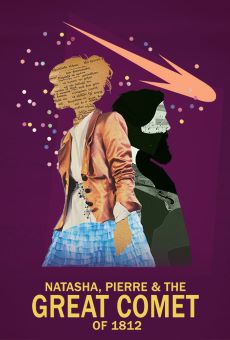THE GREATEST PRODUCTION YOU’LL EVER SEE
OF A PERPLEXING MUSICAL
If you ever want to see Natasha, Pierre and the Great Comet of 1812 by Dave Malloy, Writers Theatre is the place to see it. I say “if” because this sung-through musical adaptation of a chapter of Leo Tolstoy’s War and Peace is not for everyone, and I must admit to you now that it wasn’t for me. However, this production is absolutely superb in every way — from the arresting costumes by Raquel Adorno to the stellar cast. I cannot pinpoint a single thing wrong with this production. All my complaints are with the material.
Evan Tyrone Martin and cast
Before I air my grievances with Mr. Malloy, I’d like to give this creative team their well-earned praise. Director and choreographer Katie Spelman has stitched together something truly magical. Every creative element fits like a laser cut puzzle piece, and it takes a skilled director like Spelman to make that happen. It’s clear Spelman worked with her actors to dig into the hearts of these slightly silly characters to bring something real out of them. It helps that she had such a talented and intelligent cast to work with.
Aurora Penepacker, Joseph Anthony Byrd
Aurora Penepacker is stunning and funny as the naïve and passionate Natasha. Maya Rowe brings her luxurious voice and touching sincerity to Sonya. Joseph Anthony Byrd lends his incredible tenor and charming swagger to Anatole. Julia Wheeler Lennon steals scenes as the “plain” Mary so much so that I was disappointed her character didn’t have a larger part to play. And so on and so forth. There was not a weak link among them.
The Cast
The set design by Courtney O’Neill cannot go unmentioned. Her attention to detail transforms the space into something fit for royalty. Audiences are greeted with a grand mansion complete with a marble floor and sweeping staircase. I was thoroughly entertained by the set alone before the show even began.
Aurora Penepacker
Now we can return to my complaints for the writer, Dave Malloy. He chose one chapter of War and Peace as the basis for his musical: Book 8, Chapter 22. I have not read War and Peace, and after watching this musical my first thought was “why on earth did he pick this chapter?” But after doing a little research I’ve learned that Book 8, Chapter 22 ends with a very famous paragraph. This one paragraph is apparently one of the most beloved segments of Tolstoy’s writing, and after reading it myself, I can see why. It conveys the out of body experience that only comes a few times in your life, when, after a period of darkness, life finally seems to crack open and you step outside into a magical moment from nature — the first snowfall, a double rainbow, or in this case, the great comet of 1812 — your sign that life just might be good again.
The Cast
By the time Natasha, Pierre and the Great Comet of 1812 gets to this paramount moment, I had forgotten the great comet was part of the title, and I was surprised to find a comet appearing at all because it seems to hold little to no meaning in the larger context of the piece.
Bri Sudia and The Cast
Pierre, played by the commanding Evan Tyrone Martin, doesn’t seem to hold much meaning in the larger context of the piece either (through no fault of Martin’s). I can’t understand why Pierre is positioned as our protagonist when everything else in the musical seems to revolve around Natasha. Researching War and Peace helped me understand this a bit more, but I believe the musical should be able to stand on its own without that context.
Aurora Penepacker (Natasha), Evan Tyrone Martin (Pierre)
Besides my complaints with the plot, I would also like to address the style in which Malloy choses to tell this story. It seems terribly confused to me. Is it parodying Tolstoy or paying tribute to him? Is it parodying the form of opera or making an earnest attempt? The style of music jumps all over the place from the very fun “Prologue,” which uses a “Twelve Days of Christmas” format to introduce us to all the characters in a rapid, memorable way to some far more serious and far less memorable sung-through dialogue sections. Honestly, I’d rather those sections were just spoken. I found myself wanting the music to either lean further into the opera form and add some complexity at least in the underscoring or abandon opera entirely and just embrace dialogue like a good musical. In my opinion, which I know many will disagree with, this is neither a good opera nor a good musical. In its most successful moments (the moments of comedy), this is a delightful operetta, but as a whole, I have no desire to ever subject myself to Natasha, Pierre and the Great Comet of 1812 again. I am immensely grateful that my one and only experience of this frustrating creation was at Writers Theatre where I know I saw it in its best form.
Joseph Anthony Byrd, Aurora Penepacker
The creative team includes: Matt Deitchman (Music Director), Yael Lubetzky (Lighting Designer), Eric Backus (Sound Designer), Rae Watson (Properties Designer), Charlotte River-Hoster (Conductor/Piano/Associate Music Director), Amber Wuttke (Violence Director), Melissa Foster (Vocal Coach), and Roger Ellis (Associate Director). The stage manager is Miranda Anderson.
photos by Liz Lauren
Natasha, Pierre & the Great Comet of 1812
Writers Theatre
Nichols Theatre, 325 Tudor Court in Glencoe
Wed at 3 (Sept. 18, Oct. 2); Wed-Fri at 7:30;
Sat at 3 & 7:30; Sun at 2; Sun at 6 (dark Sept. 22 & Oct. 6)
ends on October 27, 2024
for tickets, call 847.242.6000 or visit Writers Theatre
for more shows, visit Theatre in Chicago

